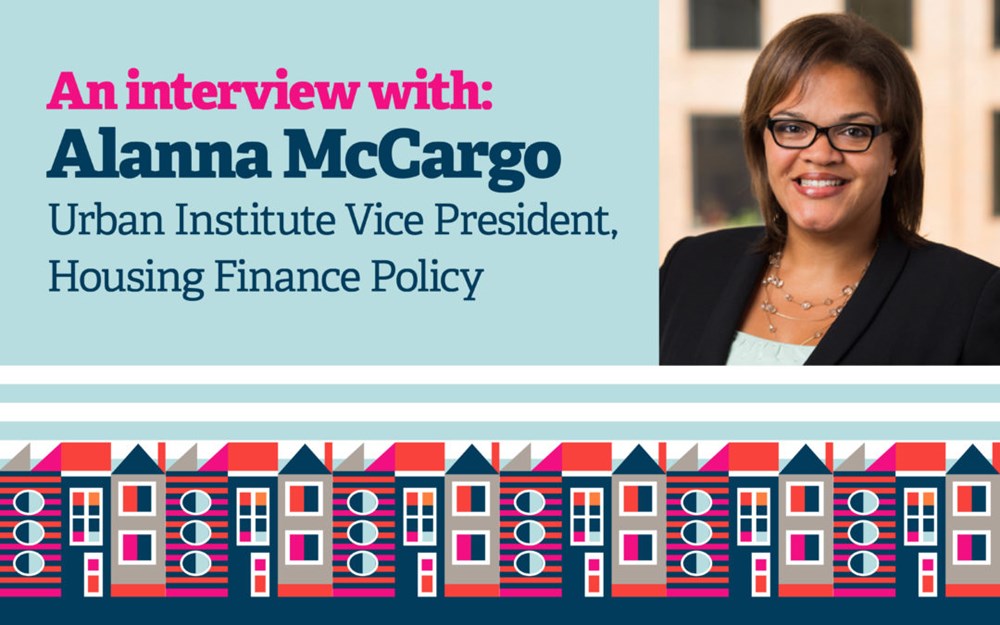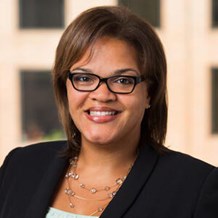In honor of Black History Month, we reached out to several prominent black leaders in the mortgage industry to celebrate their success, learn from their experience, and gain insight into the challenges facing the mortgage industry today. Today we’re thrilled to share this interview with Alanna McCargo, Vice President of Housing Finance Policy at the Urban Institute.
Alanna shares the unconventional journey that led to her current position at the Urban Institute, explains her passion for public policy and housing, and sheds light on the uphill battle for Black families seeking homeownership before offering up some potential solutions to close the racial homeownership gap.
Some of our readers might not be familiar with the Urban Institute. What would you like them to know about the Urban Institute and its Housing Finance Policy Center?
The Urban Institute is a leading nonprofit economic and social policy research organization and trusted source for unbiased insights on critical public policy issues of our time. Our Housing Finance Policy Center (HFPC) is one of 12 policy domains among issues like tax policy, health policy, justice policy and education policy. We provide timely, relevant policy analysis and critical data on US Housing finance policy and we lead national and local programs and projects that provide an evidence base for decision makers working across all parts of the housing finance ecosystem. HFPC publishes regular housing market data in a monthly chartbook publication, and we track America’s access to credit across all lending channels with our Housing Credit Availability Index that is released quarterly. I co-lead the Center with our founder, Dr. Laurie Goodman.
Tell us about how you came to be at the Urban Institute, and some of your previous roles.
My journey to Urban is unconventional. My 20+ year career in housing finance has been primarily on the business practitioner and policy side as opposed to research. I spent over a decade with Fannie Mae in various leadership roles, as well as time in the private sector managing mortgage agency portfolios and implementing borrower solutions for JP Morgan Chase. When Urban was preparing to launch its new Housing Finance Policy Center six years ago, I worked at CoreLogic, a big data company with tons of housing- and property-related data assets. We partnered with Urban to provide foundational data through a strategic alliance that helped HFPC produce its first research pieces and launch its first annual Housing Finance Symposium. I worked with Urban and the HFPC leadership team in its first two years from the outside as a strategic partner, and then joined them officially to co-lead the center into its next phase. So, I’ve been around this center since its groundbreaking and I am excited about its evolution as we continue to build and establish ourselves as a reliable and trusted source of housing finance and policy research for the nation.
What is it about public policy and housing that appeals to you the most?
For me, housing is the most fundamental of needs for every single citizen and a major human right and social justice issue of our time – whether you own or rent. Evidence-informed public policy is a powerful tool that can empower policymakers, governmental agencies, regulators, non-profits, philanthropy, and business to make the bold changes needed to meet a broad set of housing demands for the citizens of this country. Urban and HFPC work to put evidence and facts into each debate so decisions can be more informed and outcomes closely measured. We care deeply about doing social good, and we are hyper-focused on those populations who are not necessarily the first people thought about when big policy decisions are being made. We point out where policy is flawed, put a spotlight on possible unintended consequences of public policy and regulation, and we collaborate and debate issues across all parts of the housing ecosystem. Bringing new data and approaches to housing policy is what is most appealing to me, and seeing the influence of evidence-informed policymaking is the ultimate reward.
You’ve done a lot of work exploring the gap in Black homeownership. Looking at the data, what can you tell us about the people who are being left out?
I am from the school of thought that owning a home or property matters to the economic prospects for all people. I have seen firsthand the difference it can make in lives and the choices it can open up for people. The tangible benefits of homeownership in the long run is that it can create greater wealth and economic mobility for families through generations.
This work for me is very personal. My parents purchased their first home in a segregated neighborhood in the Bronx in 1969, a 4-unit home where we lived in one apartment and the other units were rented for additional income. My father saved money from the rental income our property offered, and would soon buy a larger home in the New York state suburbs. I believe that the seeds for my life and my opportunities were planted there, where my parents could move us into a larger home with our own rooms in a diverse community with better schools and create the best opportunities they could for me and my siblings to thrive. My mother had the means to start her own consulting business when we moved to the suburbs because they had built up housing equity and had additional rental income streams through homeownership. My parents could help me with the down payment on my first home because of equity they had built up as homeowners. I could attend college without taking on loads of student debt because my parents were homeowners. Not achieving higher Black homeownership rates has thwarted economic mobility and stifled generations of wealth building. The persistent racial homeownership gap is leaving millions of Black families behind, and without access to a key asset and wealth building tool that has intergenerational implications for overall financial well-being.
Some key facts help sum up what we know about who is being left out in this black homeownership crisis:
- The 30-percentage point gap between black and white homeownership is larger than it was in 1968 when housing discrimination was legal
- If the black homeownership rate were the same today as it was in the year 2000, we would have 770,000 additional black homeowner households
- We need roughly 1.3 million net new black homeowner households to reach a 50 percent homeownership rate
- Homeownership is lower for black college graduates than for white high school dropouts
- Credit scores and income are two biggest drivers of the growing homeownership gap
- Blacks are experiencing a massive generational retrocession and if recent trends continue, Black people born between 1965 and 1975 (Gen X) will likely become part of the first generation since those born before 1900 to reach retirement age with more renters than homeowners among them
What are some of the barriers you’re seeing with regards to Black homeownership, and what are some ways to address those barriers?
Barriers to accessing homeownership are plentiful. We recently developed a 5-point framework for reducing the Black homeownership gap which highlights key areas of policy and practice that could advance the field and help remove barriers. It covers homeownership challenges, including access to credit and the housing finance system, and also looks at issues with the supply of affordable housing for sale, lack of financing and capital to communities that are historically disinvested in or have lower-value homes, education and outreach needs – especially for first generation Black people looking to become owners – and the need for big, bold change and coordination at the local policy level. Our report on barriers to homeownership also highlights critical barriers to becoming a homeowner.
What single report or statistic should all mortgage professionals know concerning Black homeownership in America today?
Explaining the 30-point gap between Black and white homeownership rates nationally has been a key driver of much of our work. It’s important to understand the local context for homeownership gaps and where the widest and smallest homeownership gaps are by mapping the Black homeownership gap. Emphasizing the huge intergenerational homeownership impacts and how the differences in parental homeownership and wealth explains 12 to 13 percent of the homeownership gap between Black and white millennials.
Having a segment of the market that is underserved also means that there is an opportunity awaiting someone who is looking to grow and expand their business. What’s the best way for lenders to responsibly make the most of the opportunity?
This set of issues requires intentional focus in policy and practice to move this from a problem to an opportunity. There are still inherent structural and systemic barriers in our housing practices that everyone who is doing business in this ecosystem can be working on to help disentangle the racial homeownership gap. Whether you are the mortgage servicer, credit bureau, appraiser, real estate professional, home builder, or lender, there is opportunity to equip and empower your organization with knowledge and historical context. Making changes that are intentional towards advancing racial equity, knowing what demographics your business is serving, and reviewing business systems, processes, and practices for bias are some ways in which organizations can make begin to make meaningful changes, improve outcomes and be prepared to serve the changing demographics for housing markets.
What does the word “homeownership” mean to you?
It means opportunity, economic mobility, and stability. Homeownership is a foundational tool for wealth building and prosperity that can be passed on to future generations.
The opinions and insights expressed in this Q&A are solely those of its interviewee, Alanna McCargo, and do not necessarily represent the views of either Mortgage Guaranty Insurance Corporation or any of its parent, affiliates, or subsidiaries (collectively, “MGIC”). Neither MGIC nor any of its officers, directors, employees or agents makes any representations or warranties of any kind regarding the soundness, reliability, accuracy or completeness of any opinion, insight, recommendation, data, or other information contained in this blog, or its suitability for any intended purpose.
"

Join the conversation